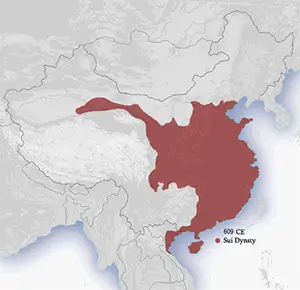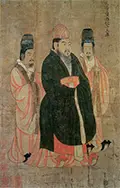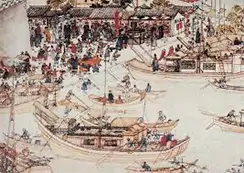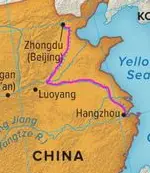China's Sui Dynasty
The Sui Dynasty ruled all of China for three decades, accomplishing that feat and completing a couple of grand construction projects before succumbing to civil unrest caused in part by the financing of all of that grand labor and conquest. In the 4th and 5th Centuries, the Northern and Southern Dynasties ruled China in divided fashion, with various powers striving for supremacy. The last of the Northern Dynasties was the Northern Zhou; one of the generals leading that army was Yang Zhong, the Duke of Sui. His son Yang Jian took the throne in 581 and restyled it the Sui Dynasty. The South was yet to be conquered, and Sui troops did that as well, completing the task by vanquishing the Chen in 589. Thus was China once again all under one dynasty. 
The new ruler of the new dynasty renamed himself Emperor Wen, established a new capital at Luoyang, and embarked on a series of expansive plans, one of which was to rebuild the Great Wall. The most famous of his programs was the construction of the Grand Canal. It is to this day the longest canal or artificial river in the world, stretching more than 1,100 miles, eventually linking to Beijing in the north.

Emperor Wen set his eyes further south and sent an army in 602 into what is now Vietnam. That army was moderately successful, taking the northern part of the modern country, and the boundaries of the Sui empire grew. The emperor died two years later, and his son, Yang Guang, replaced him. (Some sources say that son killed father in order to take the throne.) Under Yang Guang's leadership, workers completed the Grand Canal, which connected Hangzhou and Luoyang, and further rebuilt the Great Wall. Seeking to echo his father's success, Emperor Yang sent troops into Goguryeo, an ancient Korean kingdom. Despite being outnumbered, the defenders prevailed, each of the four times that they were so challenged. 
In order to finance the construction and warfare, Emperor Yang used forced labor and heavily taxed the rest of the population. He became very unpopular and was killed in 618 by one of his own advisers. The following year, a cousin of the emperor, Li Yuan, declared a new dynasty, the Tang, and named himself Emperor Gaozu. The Sui Dynasty was known for its tolerance of Confucianism and its encouragement of the spread of Buddhism. Emperor Wen, in particular, is revered by historians for leaving a large agricultural surplus and an elementary penal code. In addition, that emperor instituted a large-scale land redistribution system, angering the land-owning rich and favoring the poor. |
|
Social Studies for Kids
copyright 2002–2024
David White






